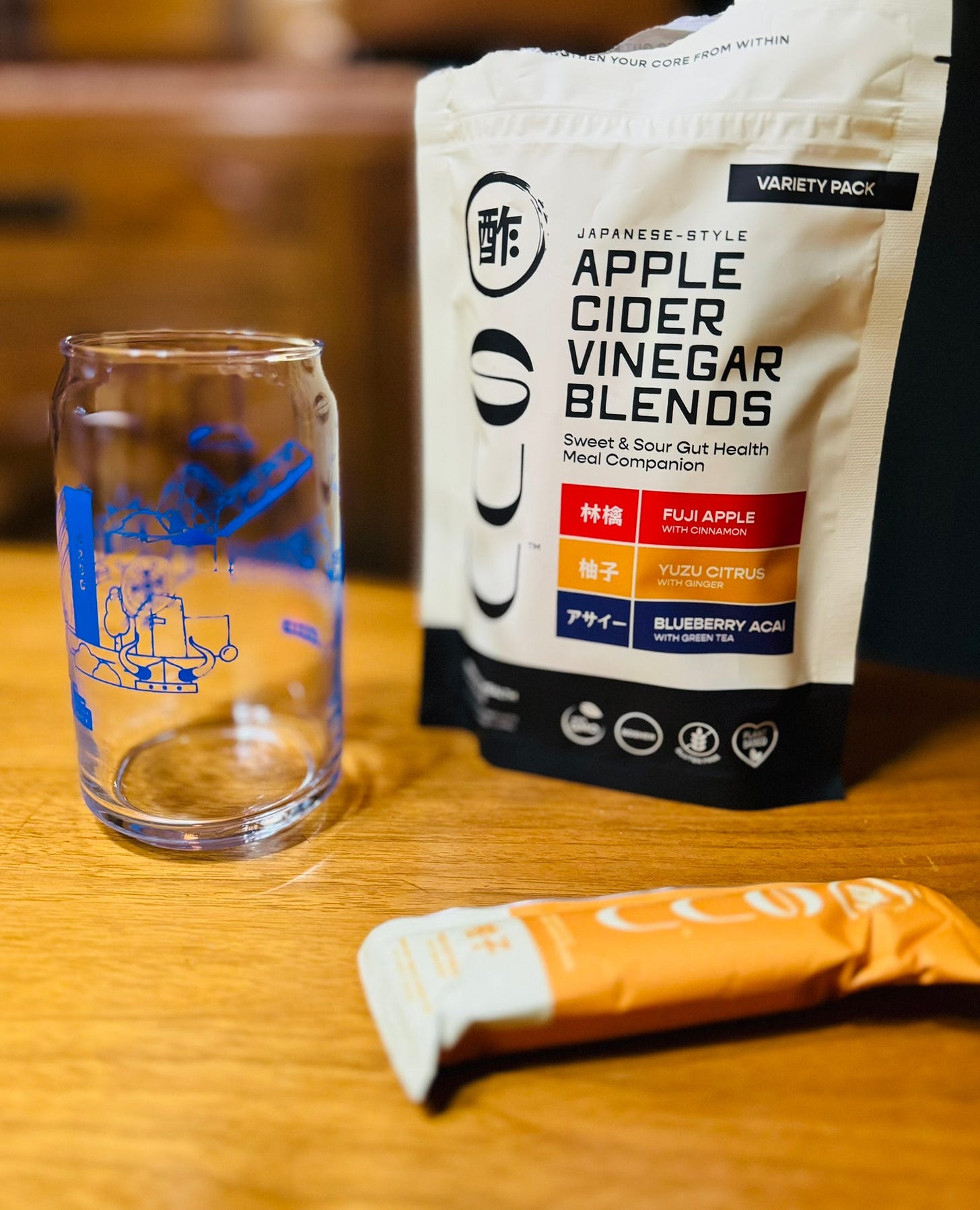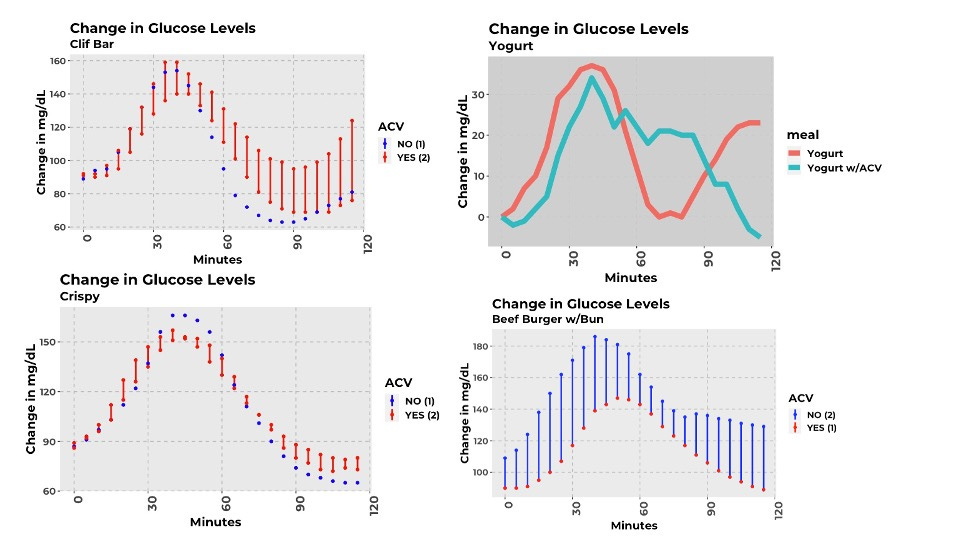Personal Science Week - 240725 Apple Cider Vinegar
Does ACV affect my glucose, plus more links
Apple cider vinegar (ACV) is a fermented liquid you can buy at any grocery store, commonly used for adding a touch of acidic flavor to cooking. Many people also drink it straight, claiming it has health benefits.
Let’s experiment to see if it works for me.
Is Apple Cider Vinegar good for you? You’ll find plenty of information online that recommends ACV for everything from weight management (it affects satiety) to acne and other skin problems (it has antimicrobial properties) to cardiovascular health (it may help control cholesterol)
Most of the health benefits of ACV are attributed to its 5-6% levels of acetic acid, which may influence metabolic processes such as glucose metabolism and fat accumulation. The polyphenols and other antioxidants in ACV could also contribute to its health-promoting effects by reducing oxidative stress. Plus, the prebiotic pectin found in ACV might support gut health by promoting the growth of beneficial bacteria.
Suu (EnjoySuu.com) is a Japanese cider vinegar company that sells small packets of specially flavored apple cider vinegar meant for drinking. You mix the packets (which they call a “sachet”) into a glass of regular water and drank it. Yes, it’s a bit on the sour side, but nothing serious. I actually find myself enjoying the flavors as a nice alternative to plain water.
Earlier this month I participated in a trial of Suu Apple Cider Vinegar (ACV) organized by Tastermonial, the personal science company we’ve mentioned previously (PSWeek 230406, 231002) that lets you participate in short food and nutritional experiments.
They work with food brands, like Suu, who want quick, quantitative feedback about how their products perform in real users. As an alternative to the typical academic or professional research organization—likely to cost hundreds of thousands of dollars and take a year or more—Tastermonial does small-scale testing with their volunteer “tasterforce”, often generating preliminary results in a month or two, for a fraction of the cost of a full-blown clinical study.
.
Volunteers like me are sent a free box of food samples, plus instructions for how to participate in the trial, often involving a Continuous Glucose Monitor (CGM), either your own or one they can provide for a small fee.
So for one week, I drank the Suu ACV in variations combinations together with other foods. Here are my results while eating a Clif Bar, a cup of yogurt, a Blake’s Seed-based crispy bar, and a regular beef burger with a bun. In all of these plots, lower values are better. The blue dots are my glucose levels when eating the food after drinking ACV; the red dots are the same meal without ACV.
I was only able to try each food a couple of times during the ten-day experiment, so my results aren’t scientifically valid. But if there’s an effect, it wasn’t very large, at least for me. Perhaps Tastermonial will find something when they test on their large group of users. More importantly, it’s likely that the effect works in some people but not others, so their study may be able to quickly zero in on the demographic factors that matter most.
Personal science links of interest
Do you suffer from chronic lower back pain? Join more than 3000 others in the BACKHOME study by UCSF. For now, it means you fill out a survey every couple of months but the researchers say they’ll call you into other clinical trials in the future.
Back in PSWeek 230706, we wrote about our experience measuring the electromagnetic fields (EMF) around us, which are sometimes accused of having an impact on health. Now one of our fans tells us about Blueshield, a new series of anti-EMF products that claim to “harmonize” the random radio signals around you. Rather than block the waves, Blueshield says it produces a competing field that prepares and protects your body. Our friend swears it works, and the company claims they’ll soon publish results of an extensive study. Cost: a couple hundred dollars, depending on the model.
Co-designing a wiki-based community knowledge management system for personal science describes “the development of the Personal Science Wiki, an open repository for documenting and accessing individual self-tracking projects while facilitating the establishment of consensus knowledge”.
Like us, Supreme Court Justice Sotomayor is skeptical of experts. Todd Meyers writes how Justice Sotomayor highlights risks of bias and uncertainty in “expert” judgments: In a recent ruling she notes the areas of science that are more error prone are those that rely on the judgment of “experts” as opposed to laboratory science. “She cited a 2009 report from the National Academy of Sciences that assessed the accuracy of forensic science. Contrasting DNA evidence with the judgment of experts, the authors wrote, “In terms of scientific basis, the analytically based disciplines generally hold a notable edge over disciplines based on expert interpretation.” They added that, “The findings of forensic science experts are vulnerable to cognitive and contextual bias.”
About Personal Science
How do you decide what to believe, especially on matters that affect your personal health or other everyday situations that affect you and your loved ones? You can rely on “trusted sources”, of course, but even the highly-credentialed experts often disagree, so how you decide which source to believe? And even if something is well-proven to work for lots of people, there are always outliers—and you might be the outlier.
Personal science is the idea that normal people can answer questions the same way that professional scientists do: through careful, open-minded skepticism backed by experiment. In Personal Week, we share ideas and thoughts like this every Thursday. If you have other topics you’d like to discuss, please let us know.




Can you share any of your observations on the satiety after meals with vs. without the Vinegar? Did you also observe the glucose spike reduction or the glucose spike delay effects of other ACV brands?
I'm near the end of the same trial, too, and don't think I noticed any major effects, either, but need to go back and review the data! If apple cider vinegar alters the microbiome, I wonder if you might see an effect after a couple of weeks, rather than instantaneously? This raises some questions around experiment design...